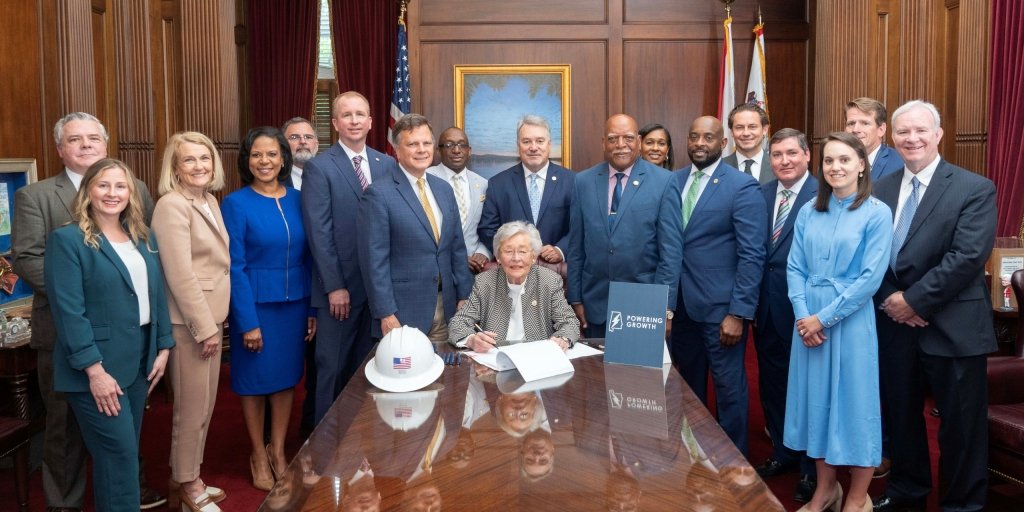Gov. Ivey Signs “Promoting Growth” Energy Infrastructure Package
On Wednesday, Governor Kay Ivey signed a substantial energy infrastructure package called “Promoting Growth.” This initiative aims to secure Alabama’s energy future, boost economic development, and tackle ongoing supply chain issues across the state.
The new law, which has garnered support from state officials and business advocates, lays the groundwork for establishing the Alabama Energy Infrastructure Bank. It’s designed to enhance the state’s energy resources, simplify permitting processes, and make industrial sites more appealing to businesses looking to create jobs.
“For Alabama’s economy to thrive, we need reliable power,” Ivey emphasized. “It’s all about the power of growth. We must ensure our energy infrastructure can support new industries and jobs for a stronger future.”
This legislation aligns closely with the objectives of the Alabama Growth Alliance, which is focused on preparing sites and making long-term investments that allow both urban and rural areas to compete for significant industrial developments.
The law also aims to minimize regulatory hurdles, enabling energy infrastructure projects to progress more swiftly and economically, which is crucial for businesses that value speed and predictability.
Additionally, it addresses the lengthy wait times associated with essential energy components and seeks to mitigate delays in site preparation and approvals claimed by the government. This plan will fund the “power-preparation” of more industrial sites, addressing one of the main obstacles in attracting businesses and ensuring immediate access to energy resources.
A key feature of this legislation is the formation of the Alabama Energy Infrastructure Bank, which will provide flexible funding options for the necessary power infrastructure linked to job creation. This initiative is also intended to enhance grid reliability and attract private and federal investments without increasing taxes.
According to Alabama Secretary of Commerce Ellen McNair, the demand for energy is a pivotal factor in site selection processes.
“Investing in our energy infrastructure and addressing supply chain vulnerabilities in both urban and rural settings establishes a solid foundation for long-term economic prosperity, ensuring Alabama remains a prime destination for companies,” McNair explained.
This legislation followed a comprehensive state study commissioned by the Alabama Legislature and the Department of Commerce, which identified the Energy Infrastructure Bank and other vital projects necessary for bolstering the state’s industrial development capabilities.
State Senator Arthur O’R-Decatur commended the forward-thinking approach taken in planning these initiatives.
“The growth of the Power Ring is a visionary strategy designed to identify and meet tomorrow’s energy needs today,” Orr noted. “We don’t want to be scrambling when the waters rise; we’re working now to lay the groundwork for competing in economic development for years to come.”
House Speaker Nathaniel Ledbetter referred to the initiative as a strategic investment that seeks to balance growth with sustainability.
“This act symbolizes a strategic investment in Alabama’s future, making sure we have the necessary energy resources to foster job creation and growth, all while ensuring that this growth is sustainable and doesn’t burden taxpayers,” Ledbetter said.
Senate President Pro Tem Gudger emphasized the focus on rural areas during the plan’s development.
“We made sure this investment would benefit rural Alabama significantly,” Gudger stated. “Ensuring energy security is crucial for growth, and this is a major step forward for us in Alabama.”
The Powering Growth Act exemplifies the broader efforts by Alabama leaders to place the state at the forefront of industrial recruitment and infrastructure readiness, joining other pro-growth initiatives established during Ivey’s administration.
















